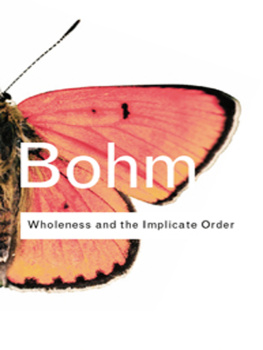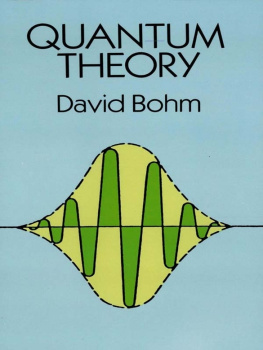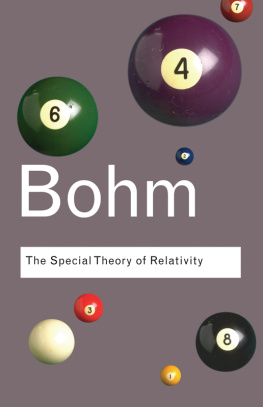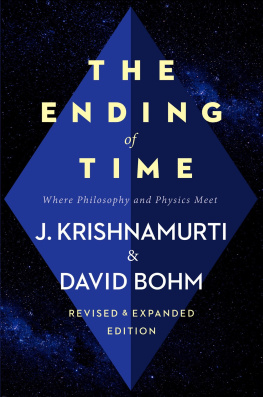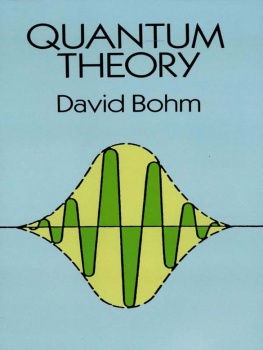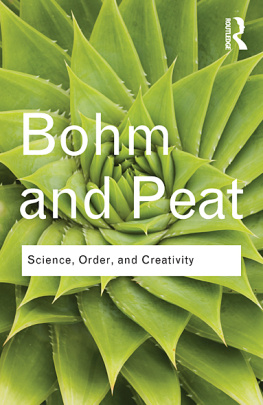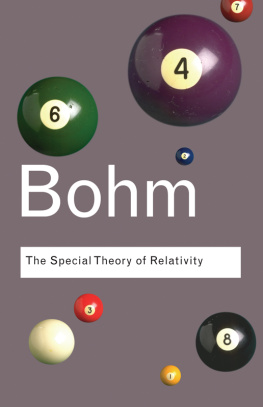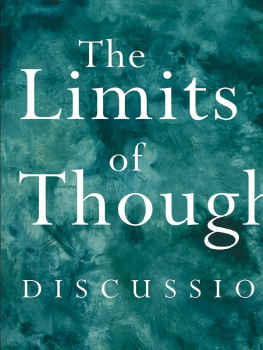David Bohm - Wholeness and the Implicate Order
Here you can read online David Bohm - Wholeness and the Implicate Order full text of the book (entire story) in english for free. Download pdf and epub, get meaning, cover and reviews about this ebook. year: 2005,1980, publisher: Taylor and Francis, genre: Religion. Description of the work, (preface) as well as reviews are available. Best literature library LitArk.com created for fans of good reading and offers a wide selection of genres:
Romance novel
Science fiction
Adventure
Detective
Science
History
Home and family
Prose
Art
Politics
Computer
Non-fiction
Religion
Business
Children
Humor
Choose a favorite category and find really read worthwhile books. Enjoy immersion in the world of imagination, feel the emotions of the characters or learn something new for yourself, make an fascinating discovery.
- Book:Wholeness and the Implicate Order
- Author:
- Publisher:Taylor and Francis
- Genre:
- Year:2005,1980
- Rating:5 / 5
- Favourites:Add to favourites
- Your mark:
- 100
- 1
- 2
- 3
- 4
- 5
Wholeness and the Implicate Order: summary, description and annotation
We offer to read an annotation, description, summary or preface (depends on what the author of the book "Wholeness and the Implicate Order" wrote himself). If you haven't found the necessary information about the book — write in the comments, we will try to find it.
Wholeness and the Implicate Order — read online for free the complete book (whole text) full work
Below is the text of the book, divided by pages. System saving the place of the last page read, allows you to conveniently read the book "Wholeness and the Implicate Order" online for free, without having to search again every time where you left off. Put a bookmark, and you can go to the page where you finished reading at any time.
Font size:
Interval:
Bookmark:

The author and publisher would like to thank the following for permission to reproduce copyright material: The Van Leer Jerusalem Foundation (, from Foundations of Physics , vol. 1, no. 4, 1971, pp. 35981 and vol. 3, no. 2, 1973, pp. 13968).
The title of this chapter is Fragmentation and wholeness. It is especially important to consider this question today, for fragmentation is now very widespread, not only throughout society, but also in each individual; and this is leading to a kind of general confusion of the mind, which creates an endless series of problems and interferes with our clarity of perception so seriously as to prevent us from being able to solve most of them.
Thus art, science, technology, and human work in general, are divided up into specialities, each considered to be separate in essence from the others. Becoming dissatisfied with this state of affairs, men have set up further interdisciplinary subjects, which were intended to unite these specialities, but these new subjects have ultimately served mainly to add further separate fragments. Then, society as a whole has developed in such a way that it is broken up into separate nations and different religious, political, economic, racial groups, etc. Mans natural environment has correspondingly been seen as an aggregate of separately existent parts, to be exploited by different groups of people. Similarly, each individual human being has been fragmented into a large number of separate and conflicting compartments, according to his different desires, aims, ambitions, loyalties, psychological characteristics, etc., to such an extent that it is generally accepted that some degree of neurosis is inevitable, while many individuals going beyond the normal limits of fragmentation are classified as paranoid, schizoid, psychotic, etc.
The notion that all these fragments are separately existent is evidently an illusion, and this illusion cannot do other than lead to endless conflict and confusion. Indeed, the attempt to live according to the notion that the fragments are really separate is, in essence, what has led to the growing series of extremely urgent crises that is confronting us today. Thus, as is now well known, this way of life has brought about pollution, destruction of the balance of nature, over-population, world-wide economic and political disorder, and the creation of an overall environment that is neither physically nor mentally healthy for most of the people who have to live in it. Individually there has developed a widespread feeling of helplessness and despair, in the face of what seems to be an overwhelming mass of disparate social forces, going beyond the control and even the comprehension of the human beings who are caught up in it.
Indeed, to some extent, it has always been both necessary and proper for man, in his thinking, to divide things up, and to separate them, so as to reduce his problems to manageable proportions; for evidently, if in our practical technical work we tried to deal with the whole of reality all at once, we would be swamped. So, in certain ways, the creation of special subjects of study and the division of labour was an important step forward. Even earlier, mans first realization that he was not identical with nature was also a crucial step, because it made possible a kind of autonomy in his thinking, which allowed him to go beyond the immediately given limits of nature, first in his imagination and ultimately in his practical work.
Nevertheless, this sort of ability of man to separate himself from his environment and to divide and apportion things ultimately led to a wide range of negative and destructive results, because man lost awareness of what he was doing and thus extended the process of division beyond the limits within which it works properly. In essence, the process of division is a way of thinking about things that is convenient and useful mainly in the domain of practical, technical and functional activities (e.g., to divide up an area of land into different fields where various crops are to be grown). However, when this mode of thought is applied more broadly to mans notion of himself and the whole world in which he lives (i.e. to his self-world view), then man ceases to regard the resulting divisions as merely useful or convenient and begins to see and experience himself and his world as actually constituted of separately existent fragments. Being guided by a fragmentary self-world view, man then acts in such a way as to try to break himself and the world up, so that all seems to correspond to his way of thinking. Man thus obtains an apparent proof of the correctness of his fragmentary self-world view though, of course, he overlooks the fact that it is he himself, acting according to his mode of thought, who has brought about the fragmentation that now seems to have an autonomous existence, independent of his will and of his desire.
Men have been aware from time immemorial of this state of apparently autonomously existent fragmentation and have often projected myths of a yet earlier golden age, before the split between man and nature and between man and man had yet taken place. Indeed, man has always been seeking wholeness mental, physical, social, individual.
It is instructive to consider that the word health in English is based on an Anglo-Saxon word hale meaning whole: that is, to be healthy is to be whole, which is, I think, roughly the equivalent of the Hebrew shalem. Likewise, the English holy is based on the same root as whole. All of this indicates that man has sensed always that wholeness or integrity is an absolute necessity to make life worth living. Yet, over the ages, he has generally lived in fragmentation.
Surely, the question of why all this has come about requires careful attention and serious consideration.
In this chapter, attention will be focused on the subtle but crucial role of our general forms of thinking in sustaining fragmentation and in defeating our deepest urges toward wholeness or integrity. In order to give the discussion a concrete content we shall to some extent talk in terms of current scientific research, which is a field that is relatively familiar to me (though, of course, the overall significance of the questions under discussion will also be kept in mind).
What will be emphasized, first of all in scientific research and later in a more general context, is that fragmentation is continually being brought about by the almost universal habit of taking the content of our thought for a description of the world as it is. Or we could say that, in this habit, our thought is regarded as in direct correspondence with objective reality. Since our thought is pervaded with differences and distinctions, it follows that such a habit leads us to look on these as real divisions, so that the world is then seen and experienced as actually broken up into fragments.
The relationship between thought and reality that this thought is about is in fact far more complex than that of a mere correspondence. Thus, in scientific research, a great deal of our thinking is in terms of theories . The word theory derives from the Greek theoria, which has the same root as theatre, in a word meaning to view or to make a spectacle. Thus, it might be said that a theory is primarily a form of insight , i.e. a way of looking at the world, and not a form of knowledge of how the world is.
In ancient times, for example, men had the theory that celestial matter was fundamentally different from earthly matter and that it was natural for earthly objects to fall while it was natural for celestial objects, such as the moon, to remain up in the sky. With the coming of the modern era, however, scientists began to develop the viewpoint that there was no essential difference between earthly matter and celestial matter. This implied, of course, that heavenly objects, such as the moon, ought to fall, but for a long time men did not notice this implication. In a sudden flash of insight Newton then saw that as the apple falls so does the moon, and so indeed do all objects. Thus, he was led to the theory of universal gravitation, in which all objects were seen as falling toward various centres (e.g. the earth, the sun, the planets, etc.). This constituted a new way of looking at the heavens, in which the movements of the planets were no longer seen through the ancient notion of an essential difference between heavenly and earthly matter. Rather, one considered these movements in terms of rates of fall of all matter, heavenly and earthly, toward various centres, and when something was seen not to be accounted for in this way, one looked for and often discovered new and as yet unseen planets toward which celestial objects were falling (thus demonstrating the relevance of this way of looking).
Font size:
Interval:
Bookmark:
Similar books «Wholeness and the Implicate Order»
Look at similar books to Wholeness and the Implicate Order. We have selected literature similar in name and meaning in the hope of providing readers with more options to find new, interesting, not yet read works.
Discussion, reviews of the book Wholeness and the Implicate Order and just readers' own opinions. Leave your comments, write what you think about the work, its meaning or the main characters. Specify what exactly you liked and what you didn't like, and why you think so.

